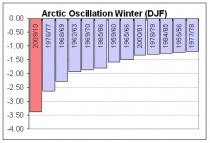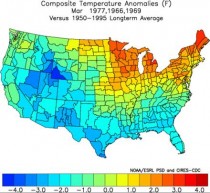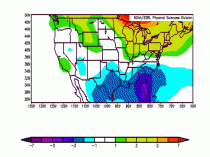By Joseph D’Aleo
The northeast had several harsh winters in the row with seasonal snow records the last two La Nina years in parts of northern and central New England. This year was a very different story especially in the lower elevations. It was a mild winter in the northeast even as areas in the Mid Atlantic to Florida and northwest to the Northern Plains were hit hard with cold (many areas coldest since the 1960s or 1970s) and in places even all time record snowfall. Why the topsy turvy weather? First let me say it was not unexpected and was the result of a combination of factors we will discuss in a moment. Here is a Boston Globe story of Record Early Ice Out on Lake Winnipesaukee near Mt. Washington, beating out the prior record set in 1921 by 4 days.
By Stefanie Geisler, Globe Staff
For 122 years, people have watched Lake Winnipesaukee to see when the ice clears and “Ice Out” can be declared, marking the coming of spring. This year, the day came so early it broke a record. Ice Out was declared Wednesday, beating the previous record, March 28, set in 1921, by four days.
David Emerson, the official ice watcher, made the declaration at 2 p.m. Wednesday. The announcement means the largest ship on the 70-square-mile lake can now safely make all ports of call, unimpeded by ice, he said. “It is a big deal,” Emerson said today of making the declaration. “But when it’s out, it’s out. You have to call it like you see it.”
Although there are still a few patches of ice on the lake, they are mostly in coves and will not block travel, Emerson said. That means the M/S Mount Washington cruise ship—which sails between the ports of Meredith, Center Harbor, Alton Bay, Wolfeboro, and Weirs Beach—can now traverse the lake.
Ice Out is a tradition dating back to 1888. The average Ice Out occurs in mid-April, Emerson said. But temperatures for January and February in the area have averaged three to five degrees warmer than normal, said. George Wiseman, a meteorologist with the National Weather Service in Grey, Maine. So far this month, the temperature in Concord has averaged 39.4 degrees, or about 7.4 degrees warmer than normal. And the high temperature has been above
freezing every day this month, according to weather service records. Emerson said the lake didn’t get a lot of snow this winter, and last week’s unusually warm temperatures - the temperature rose into the 60s and one day to 70—and buckets of rain deteriorated the ice. “Then we had the big winds there yesterday,” he said. “That finished it off.” See post here.
The winter as we reported early here was characterized by a moderately strong El Nino, and record (since 1950) negative arctic oscillation (below, enlarged here):

With the strong negative AO and North Atlantic Osicllation (NAO), the high pressure in Canada drew in maritime air into the northeast and southeast Canada where normally there is a pool of cold air that storms on the southern El Nino storm track can draw on to produce major snows for inland ande sometimes even coastal areas. The maritime air was cold enough to allow snow to fall in the higher elevations (it was a decent ski season) each time the coastal storms romped up the coast but it was a cold rain down in lower elevations to the coast.
March 1977 was quite mild, in fact compositing the top 3 most negative AO winter Marchs we see (below, enlarged here):

This March has looked like those years thus far (though some arctic air invaded briefly today in the northeast). Notice also that it has remained cold in the southeast (below, enlarged here):

It has been very wet in the east with several nor’easters that had there been cold arctic air in place instead of maritime Atlantic air would have buried the region in snow. Instead heavy flooding rains have resulted in the wettest March beating out 1953 in Boston and 1983 in New York City. It was the wettest month ever in Providence, RI (see story here).
And thanks to Craig from Weather Source (an excellent source of weather data), Minneapolis may end March without snow for the first time since the 1800s. “It looks like we’ll finish out the month without snow,” says FOX 9 meteorologist Erik Maitland. “This will be the third time that we’ve done that. But you have to go way back to 1860, 1878 for snowless Marches.” See more here and here.




